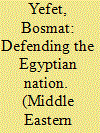|
|
|
Sort Order |
|
|
|
Items / Page
|
|
|
|
|
|
|
| Srl | Item |
| 1 |
ID:
164909


|
|
|
|
|
| Summary/Abstract |
This article discusses the Muslim discourse concerning the Coptic Christian minority since the 2000s in Egypt. Emphasizing the effects of the January 2011 uprising, the paper analyzes the role of nationalism and the national unity discourse in suppressing the debate regarding discrimination against the Copts. Despite the fissures that were created in the discourse, which rejects any reference to discrimination against the Copts, the Coptic issue remains trapped among the contested interpretations of national unity. All narratives of national unity and Egyptian essence, whether the official one pursued by the regime or the one promoted by pro-democracy activists, require the Copts to suppress their demand for rights for the sake of national unity. Adherence to the national unity discourse by all forces precludes the possibility of developing a form of nationalism or a national culture which embodies pluralism of identities and cultures and reinforces the role of nationalism as a tool for stifling pluralism and democracy for all Egyptians, whether Muslim majority or minorities.
|
|
|
|
|
|
|
|
|
|
|
|
|
|
|
|
| 2 |
ID:
175042


|
|
|
|
|
| Summary/Abstract |
The 2011 uprising that led to the overthrow of Mubarak was perceived as an expression of the awakening of civil society in the face of authoritarian rule, leading to a re-examination of its role as an agent for democratic change. Nevertheless, the re-entrenchment of authoritarianism confirmed prior critical discussions regarding civil society limitations. This paper focuses on the role of the human rights movement during the revolution and its aftermath and reveals the activists’ reflections on its failure. The discussion refers to the limitations of human rights organizations but also exposes the possibilities created by the revolution and the impact of the ‘new civic activism’, which extricated human rights activism from the enclaves of the professional organizations. This analysis requires us to reconsider the definitions of civil society, which focus on formal organizations, and view it as a space in which various actors, including fluid and horizontal forms of activism, engage through contention and cooperation. Such an analysis drew our attention to the activists themselves and exposes the variety of actors working for reform, their various interpretations of the anti-democratic reality, and their potential to establish an anti-hegemonic narrative.
|
|
|
|
|
|
|
|
|
|
|
|
|
|
|
|
| 3 |
ID:
175049


|
|
|
|
|
| Summary/Abstract |
The 2011 uprising that led to the overthrow of Mubarak was perceived as an expression of the awakening of civil society in the face of authoritarian rule, leading to a re-examination of its role as an agent for democratic change. Nevertheless, the re-entrenchment of authoritarianism confirmed prior critical discussions regarding civil society limitations. This paper focuses on the role of the human rights movement during the revolution and its aftermath and reveals the activists’ reflections on its failure. The discussion refers to the limitations of human rights organizations but also exposes the possibilities created by the revolution and the impact of the ‘new civic activism’, which extricated human rights activism from the enclaves of the professional organizations. This analysis requires us to reconsider the definitions of civil society, which focus on formal organizations, and view it as a space in which various actors, including fluid and horizontal forms of activism, engage through contention and cooperation. Such an analysis drew our attention to the activists themselves and exposes the variety of actors working for reform, their various interpretations of the anti-democratic reality, and their potential to establish an anti-hegemonic narrative.
|
|
|
|
|
|
|
|
|
|
|
|
|
|
|
|
| 4 |
ID:
184345


|
|
|
|
|
| Summary/Abstract |
This article offers a new perspective on the extensive discussion of the role of new media in facilitating the 2011 Egyptian uprising by placing it within the historical context of how the state responded to new media in the previous decades. This article uses an archaeological analysis of state media to reveal how the state coped with the news media (newspapers, radio, television, satellite television) in the past to infer the present relationship between the state and the new media (the internet and social media). We discerned a recurring cyclical pattern characterized by a dynamic of openness–adaptation–narrowing, which sheds light on the media’s ability to challenge state authority and on the state’s ability to contain and limit new media. We suggest that the role of the internet and social media in the Egyptian “Arab Spring” should be viewed as being on this continuum, as an extension of processes of state–media relations that had developed in the preceding decades.
|
|
|
|
|
|
|
|
|
|
|
|
|
|
|
|
|
|
|
|
|